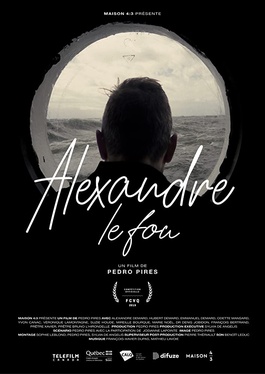Related Research Articles
The Prix Iris is a Canadian film award, presented annually by Québec Cinéma, which recognizes talent and achievement in the mainly francophone feature film industry in Quebec. Until 2016, it was known as the Jutra Award in memory of influential Quebec film director Claude Jutra, but Jutra's name was withdrawn from the awards following the publication of Yves Lever's biography of Jutra, which alleged that he had sexually abused children.

The Sower is a Canadian documentary film, directed by Julie Perron and released in 2013. The film centres on Patrice Fortier, an artist and seed technician who tries to preserve biodiversity by planting and maintaining rare plant cultivars.
Sara Mishara is an American-Canadian cinematographer. She has been a three-time Canadian Screen Award winner for Best Cinematography at the 7th Canadian Screen Awards in 2019 for her work on the film The Great Darkened Days , at the 10th Canadian Screen Awards in 2022 for Drunken Birds , and at the 11th Canadian Screen Awards in 2023 for Viking.

Alexander Odyssey is a Canadian documentary film, directed by Pedro Pires and released in 2019. The film premiered at the Quebec City Film Festival on September 15, 2019, before premiering commercially on September 20.
Mathieu Laverdière is a Canadian cinematographer, who won the Prix Iris for Best Cinematography at the 23rd Quebec Cinema Awards in 2021 for Underground (Souterrain).
The Prix Iris for Best Cinematography is an annual film award presented by Québec Cinéma as part of the Prix Iris awards program, to honour the year's best cinematography in the Cinema of Quebec.
The Prix Iris for Best Documentary Film is an annual film award presented by Québec Cinéma as part of its Prix Iris program, to honour the year's best documentary film made within the cinema of Quebec.
The Prix Iris for Best Cinematography in a Documentary is an annual film award, presented by Québec Cinéma as part of its Prix Iris awards program, to honour the year's best cinematography in documentary films made within the Cinema of Quebec.
The Prix Iris for Best Editing in a Documentary is an annual film award, presented by Québec Cinéma as part of its Prix Iris awards program, to honour the year's best film editing in documentary films made within the Cinema of Quebec.
The Prix Iris for Best Animated Short Film is an annual film award presented by Québec Cinéma as part of its Prix Iris program, to honour the year's best animated short film made within the cinema of Quebec.
The Prix Iris for Best Sound in a Documentary is an annual film award, presented by Québec Cinéma as part of its Prix Iris awards program, to honour the year's best film sound in documentary films made within the Cinema of Quebec.
The Prix Iris for Best Original Music is an annual film award, presented by Québec Cinéma as part of its Prix Iris awards program, to honour the year's best music in films made within the Cinema of Quebec. Unlike some other film awards, which present separate categories for scores and songs, the Prix Iris only presents a single music category inclusive of both types of film music.
The Prix Iris for Best Sound is an annual film award presented by Québec Cinéma as part of the Prix Iris awards program, to honour the year's best sound in feature films made within the Cinema of Quebec. Unlike some film awards, Québec Cinéma does not present separate awards for overall sound and sound editing, but instead honours the full sound team in a single category; however it does also present a distinct category for Best Sound in a Documentary.
Prayer for a Lost Mitten is a Canadian documentary film, directed by Jean-François Lesage and released in 2020. The film centres on the lost and found office of the Montreal Metro system.

Michel La Veaux is a Canadian cinematographer and documentary filmmaker. He is most noted for his work on the films The Dismantling , for which he won the Jutra Award for Best Cinematography at the 16th Jutra Awards, and The Fireflies Are Gone , for which he won the Borsos Competition award for best cinematography in a Canadian film at the 2018 Whistler Film Festival.
Wandering: A Rohingya Story is a Canadian documentary film, directed by Mélanie Carrier and Olivier Higgins and released in 2020. The film is a portrait of the Kutupalong refugee camp in Bangladesh, which houses a large number of refugees from the Rohingya conflict in Myanmar.
The Prix Iris for Best Short Documentary is an annual award, presented by Québec Cinéma as part of its Prix Iris program, to honour the best short documentary films made in the Cinema of Quebec. The award was presented for the first time at the 23rd Quebec Cinema Awards in 2021.
The Prix Iris for Best Original Music in a Documentary is an annual award, presented by Québec Cinéma as part of its Prix Iris program, to honour the best music for documentary films made in the Cinema of Quebec. The award was presented for the first time at the 23rd Quebec Cinema Awards in 2021.
Geographies of Solitude is a Canadian documentary film by Jacquelyn Mills that was released in 2022. The film is guided by Zoe Lucas, a naturalist and environmentalist who lives on Nova Scotia's Sable Island, where she catalogues the island's wild Sable Island horses, and endeavours to preserve its unique ecosystem.
Humus is a Canadian documentary film, directed by Carole Poliquin and released in 2022. The film centres on Mélina Plante and François D'Aoust, a farming couple in Havelock, Quebec, who are implementing sustainable agriculture techniques on their farm in response to the high worldwide risk of topsoil erosion.
References
- ↑ "Canadian Screen Awards ’15: Theatrical documentary & short film". Playback , February 16, 2015.
- ↑ "Québec Cinéma dévoile les finalistes aux PRIX IRIS 2023". CTVM, November 14, 2023.